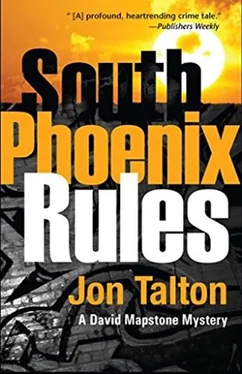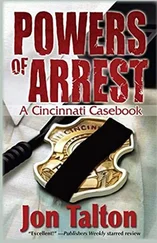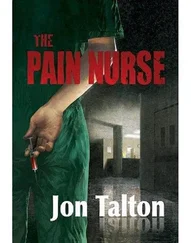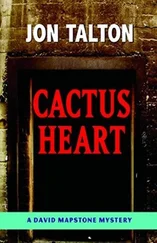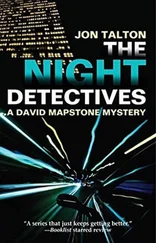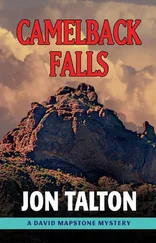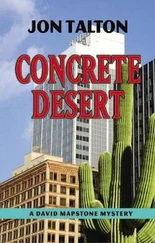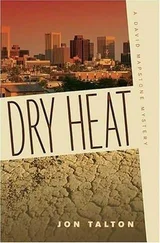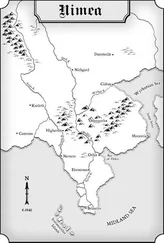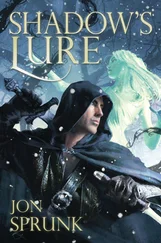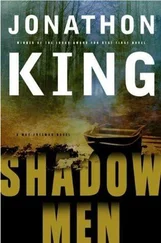They knew they’d get another shot.
It took a long time before my heart rate dropped down or before I would allow Robin to get in the front seat. It took even longer before we ventured out, behind a police SUV heading north.
“Aren’t we going inside? Report this?”
I said no. I had no license tag or decent description of the suspects, and I didn’t want to spend the rest of the night in Kate Vare’s clutches. I followed the PPD unit all the way to Roosevelt. It was one a.m. and no purple car was behind us. At Roosevelt, I turned left and slipped through the dense old Garfield district, then past the darkened art galleries on the other side of Seventh Street, bumped over the light-rail tracks by Trinity Cathedral, and headed home. I circled the house twice with the car lights off. Our PPD minders were off tonight. The street seemed empty. Then I took the chance of turning down the alley, where we could be hemmed in and ambushed. I kept the lights off. But the only commotion was the barking dog two doors down.
Later, after some time spent on the computer, I lay in bed in a T-Shirt and sweatpants. The Python under my pillow, the Five Seven on the nightstand, and I went through the events of the evening and tried to formulate a plan. How had they picked us up at the Sonic? I didn’t see any tail when we had first pulled out of the garage into the alley, then onto the street. Nobody had been watching us; my late-night walks around Cypress told me that. I had missed something, screwed up…what? I lost it in a deep sleep. When I woke up, Lindsey was next to me. But it wasn’t Lindsey. It was Robin, curled against me, facing away, with her hair in my face. It was soft and fresh smelling. I wasn’t startled and thought about running her out, but I could hear her quietly crying, feel her chest shaking and heaving. I put my arm around her and pulled her closer, felt her warmth radiate against me, and we were both quiet. In the morning I was alone on the mattress and sure I had imagined the whole thing.
Kate Vare stood on the doorstep a little after nine. She held a coffee travel mug with the city of Phoenix logo wrapped around it. She said she was there to take the evidence seal off the garage apartment. We could use it again. I led her up the stairs and she pulled the label off the door.
“So this means what?”
“To me, it’s misdemeanor homicide,” she said. “Asshole-on-asshole crime. Now we have one less asshole in the world. I’ve got plenty of cases where real people have been hurt or killed.”
She was enjoying this way too much.
“And what about Robin? She’s a real person.”
“If she’s telling the truth, we don’t have any further questions.”
“A beheaded Sinaloa cartel hit man and no further questions?” I stared past her, taking in the view at treetops from the walkway. The air was yellow brown. “What happened to your big media event? Your major case?”
“Things change, Mapstone.” She cocked her head and looked up at me. “Do you see any media? I don’t see any media. Meanwhile, we’ve got a new round of layoffs coming.”
“I’m sure Wal-Mart will hire you.”
“Oh, I’ll be around,” she said, sipping her coffee.
So I told her about the chase the night before with the Kia. She shrugged.
“Did you file a report?”
I shook my head.
“Maybe it was a robbery attempt.” One eyebrow went up. “Maybe you imagined it all. You look fine now. So if you’re worried, file a report. Meanwhile, if Ms. Bryson remembers anything she wants to tell us, call me.”
Vare turned like a figurine on a music box and stalked away. I swear she was smiling.
“She’s told you the truth.” Mostly. “Do your damned job, Kate!” I spoke to her back, which disappeared into the house.
I spent the day writing a grant proposal, to fund a history I wanted to write of Phoenix. If I was going to make my re-entry into academia, I needed to publish again. And the histories of the city were lacking. Brad Luckingham’s book left out so damned much and VanderMeer’s wasn’t even in print any longer. I fretted about my future. Every job was being chased by six unemployed persons, and the competition was much greater among people with advanced degrees in the humanities. The situation was even worse in Phoenix, by far the largest city with only one real university. I hated to be at the mercy of ASU. Although I had gone there as an undergrad, I had long since moved on. But I really needed this job. And they had come after me, several high-ranking folks urging me to apply for the job after Peralta lost the election. By the end of the day, my eyes hurt from so much computer time. Robin did yoga in the guest room and stared out at the interior courtyard, saying little.
In the afternoon, she wanted to know about the family photos on the bedroom dresser. There were my grandparents in black-and-white, around the time they married: 1912, when Arizona became a state. They looked pleasantly unsmiling at the camera, he in his narrow tie and coat, she with raven black hair and wearing a high-necked blouse. The mother and father I never knew were in several photos, my father a surprise baby born to grandmother when she was in her thirties, when they didn’t think they could have children. One picture showed him in the war, in his fighter pilot’s jacket and a P-51 Mustang behind him. “Dashing,” Robin commented. All these people looked impossibly young. Another photo: my parents and me as a baby, taken a few weeks before they flew off to Denver and never arrived. I told her stories that didn’t cut too deep.
“You’re lucky to know your past,” she said. “I don’t know anything about my dad. I only knew Linda’s mother a little, we were on the road so much.” Linda being her and Lindsey’s mother, always referred to by her first name.
She sighed and looked at the pictures. “When I was sixteen, one of Linda’s alcoholic boyfriends burned down our garage. All the family photos were lost. You should have seen Lindsey Faith. She was the beauty. I was the ugly duckling.”
“I doubt that,” I said. “I wish I would have asked more when my grandparents were still alive. Grandmother knew the entire family history.”
“So no brothers or sisters,” she said. “What about other family?”
“My grandmother had a sister. She had a beautiful acreage on Seventh Avenue, when it had irrigation ditches on either side and big trees. But she died in 1976.”
“God, you really are alone.”
I sprang up and dug into the closet. “Take a look at this.” I showed her a scrapbook that Grandmother had kept, page after page of old postcards from Phoenix in the 1930s and 1940s. One showed a narrow Central Avenue lushly bordered by palm trees and manicured grass. Other postcards were from places they had visited, plus miniatures of the labels that went on the citrus crates that were shipped out when this was a farm town. “Arizona Beauty.” “Big Town Grapefruit.” “Desert Call.” “Westward Ho.” “Kathy Anne Melons.” All were colorfully, lusciously illustrated in the style of the day.
I told her about the rich agricultural valley this had once been, even when I was young. We grew oranges, grapefruits, lettuce, cabbage, summer squash, tomatoes, beets, strawberries, cucumbers, watermelons and more. Just add water to the alluvial soil of the Salt River Valley and almost anything could flourish, especially with the ingenuity of our farmers and the water from our mighty dams and canals. Phoenix had one of the nation’s largest stockyards and major packinghouses. We shipped our produce all over the nation in long trainloads. It had almost all been lost to tract houses and shopping strips. Without a ten-thousand-mile supply chain, this city would starve. I was grateful my grandparents hadn’t lived to see it.
Читать дальше
